Scratch Day is a day programmed with loads of activities for all ages.
Participate:
From 8:30 am to 1:00 pm
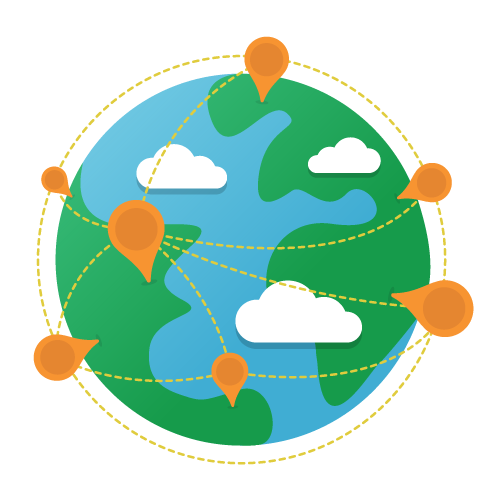
Dias
Horas
Minutos
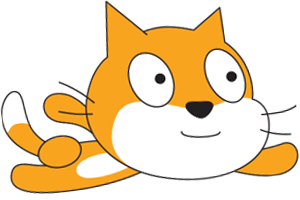


This activity proposes that participants get to know programming codes with the Scratch language by presenting exercises associated with logical thinking. In addition, complementing the first activity, there will be practice of binary representation, that is, sensitization with this form of numerical pattern that is part of computer science.
In this fun practice, teams will create navigation patterns for their own participants, as if they were programming robots. In this way, we will explore basic concepts between command and execution. The students will rely on simple codes that aim at developing logic and problem solving allied to teamwork.
This activity aims at creating a competition between two teams, using programming logic to solve problems created in the Scratch application. Using Kahoot, students will collectively choose the most convenient answers, and the most voted alternative will then be chosen by the team. The team that completes the challenge first will be the winner.
In this workshop, teams will be challenged to assemble robots and place them on opposite sides of an arena. The competition will start once the robots have been tested and are properly positioned. The goal is for the opposing team to cross the marked line. The robots can be tuned to be stronger and more resistant, with enough pulling power to pull the rope hard and resist the strength of the other team.
A hackathon is an event where programmers, designers, entrepreneurs and other professionals come together to develop projects in a short period of time. Our hackathon is a great opportunity to learn new programming and interpersonal skills. With that, the games produced will be placed in the arcades available in our Ludoteca.
Contextualized with the e-sports movement, in this space, we will hold a competition using Scratch in a competition circuit, which will contemplate different experiences and skills: robotic soccer championship; creation of an animation; and, team logo design. In the end, the groups will be evaluated by a judging commission and stipulated scores that will determine the champions.
This analogical activity aims at exercising the basic parameters of computational thinking, such as showing algorithms in practice, through sequences of instructions, as the making of a folding allows us to exercise.
This practice offered to Elementary School will be available throughout the event without the need for registration, and it will also be open to anyone who wants to participate.
Using the laser cutter, a base plate will be made with inserts in the shape of Pacman and a Pacman character with a rod will also be designed in wood. This will be the joystick that will control a Pacman game developed in Scratch. The purpose of this game is to work on the student’s motor coordination, so that they can make quick connections and thus win the game. Each slot in the wood will make the virtual Pacman move in one direction (up, down, right and left).
So, we will have one more way to present different possibilities that Scratch provides from remixes.
It is a space that will be controlled with a LEGO SPIKE robot via iPad to solve challenges on a mat-shaped board.
In this way, participants will be able to interact freely, performing challenges associated with the spatial coordinates that will make the robot perform courses, avoid obstacles and optimize the proposed routes.
With this, we are showing the versatility of the programming language in a ludic exercise that combines logic, robotics and problem solving.
This practice offered to Elementary School will be available throughout the event without the need for registration, and it will also be open to anyone who wants to participate.
Through a tactile mat controlled by a board called Makey Makey, students will be able to interact with different games created in Scratch.
Event participants will be able to test their reflexes with the classic groundhog game using a custom joystick developed at our school.
In this activity, students will be challenged, in a ludic way, to transform decimal numbers into binary numbers.
In this workshop we will present games and activities from the Scratch platform to be remixed and produced by families.
In this workshop, to celebrate the International Year of Dialogue as a Guarantee of Peace, parents and students will be invited to prepare and share a beautiful and creative panel maker with paper and folding. The activity will be even more fun with the final challenge, which invites students and parents to create an animation on the theme with the ScratchJr kitten.
In this activity, parents and students will have to use their logic and math skills to build a block language program in Scratch and make their robot escape a maze.
In this workshop, there will be a team challenge: programming the Micro:bit microcontroller board with Scratch command blocks to count the number of touches on the Buzz Wire wire. The participant who travels through the Buzz Wire circuit with the fewest touches will be the champion.
Participants in this workshop will have the objective of carrying out different missions full of challenges and obstacles. Each team will have to program and execute creative solutions using an EV3 robot and Scratch programming to win.
In this workshop, to celebrate the International Year of Dialogue as a Guarantee of Peace, parents and students will be invited to prepare and share a beautiful and creative panel maker with paper and folding. The activity will be even more fun with the final challenge, which invites students and parents to create an animation on the theme with the ScratchJr kitten.
In this space, participants will be able to experiment with various unusual objects and create their own music.
In this activity, students will be challenged to create and share their games and animations in Scratch.
In this fun activity, teams will draw sets of command blocks to solve logic problems and go through an obstacle course.
Using the laser cutter, a base plate will be made with inserts in the shape of Pacman and a Pacman character with a rod will also be designed in wood. This will be the joystick that will control a Pacman game developed in Scratch. The purpose of this game is to work on the student’s motor coordination, so that they can make quick connections and thus win the game. Each slot in the wood will make the virtual Pacman move in one direction (up, down, right and left).
So, we will have one more way to present different possibilities that Scratch provides from remixes.
Nesta oficina apresentaremos jogos e atividades da plataforma Scratch para serem remixados e produzidos pelas famílias.
In the Programming Trails space, students will be challenged in a circuit structurally divided into three environments: unplugged programming, maze with ScratchJr and space room. Organized into teams, students will need to work together to advance through each phase and overcome challenges.
A workshop with many programming challenges. Inspired by the Scratch 2023 theme, Loris Malaguzzi’s poem “The Hundred Languages of the Child”, students will participate in challenges using Scratch and LEGO Robotics Kits through three different worlds: discovery, invention and dreams.
An incredible robotics tournament with programming in Scratch in a single-elimination format. Students will compete against each other, using their knowledge of Scratch and LEGO EV3 in a robot soccer championship.
This analogical activity aims at exercising the basic parameters of computational thinking, such as showing algorithms in practice, through sequences of instructions, as the making of a folding allows us to exercise.
This practice offered to Elementary School will be available throughout the event without the need for registration, and it will also be open to anyone who wants to participate.
In this space, students will have the opportunity to explore numerous projects created in the Scratch programming language.
In this activity, children will have the opportunity to work with a visual programming tool that allows them to control the Dash & Dot Robot. An opportunity to learn numerous computational thinking concepts.
It is a space that will be controlled with a LEGO SPIKE robot via iPad to solve challenges on a mat-shaped board.
In this way, participants will be able to interact freely, performing challenges associated with the spatial coordinates that will make the robot run courses, avoid obstacles and optimize the proposed routes.
With this, we are showing the versatility of the programming language in a ludic exercise that combines logic, robotics and problem solving.
This practice offered to Elementary School will be available throughout the event without the need for registration and it will also be open to anyone who wants to participate.
In this workshop we will present games and activities from the Scratch platform to be remixed and produced by families.
In this fun practice, teams will create navigation patterns for their own participants, as if they were programming robots. In this way, we will explore basic concepts between command and execution. The students will rely on simple codes that aim at developing logic and problem solving allied to teamwork.
This activity aims at creating a competition between two teams, using programming logic to solve problems created in the Scratch application. Using Kahoot, students will collectively choose the most convenient answers, and the most voted alternative will then be chosen by the team. The team that completes the challenge first will be the winner.
In this fun workshop, students will be challenged to use the Makey Makey board with the Scratch block programming language. Board exploration activities will spark students’ creativity and imagination.
This analogical activity aims at exercising the basic parameters of computational thinking, such as showing algorithms in practice, through sequences of instructions, as the making of a folding allows us to exercise.
This practice offered to Elementary School will be available throughout the event without the need for registration, and it will also be open to anyone who wants to participate.
Nesta oficina apresentaremos jogos e atividades da plataforma Scratch para serem remixados e produzidos pelas famílias.
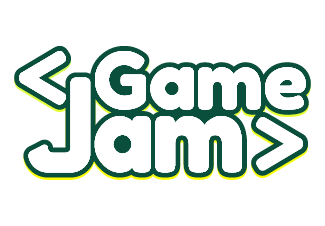
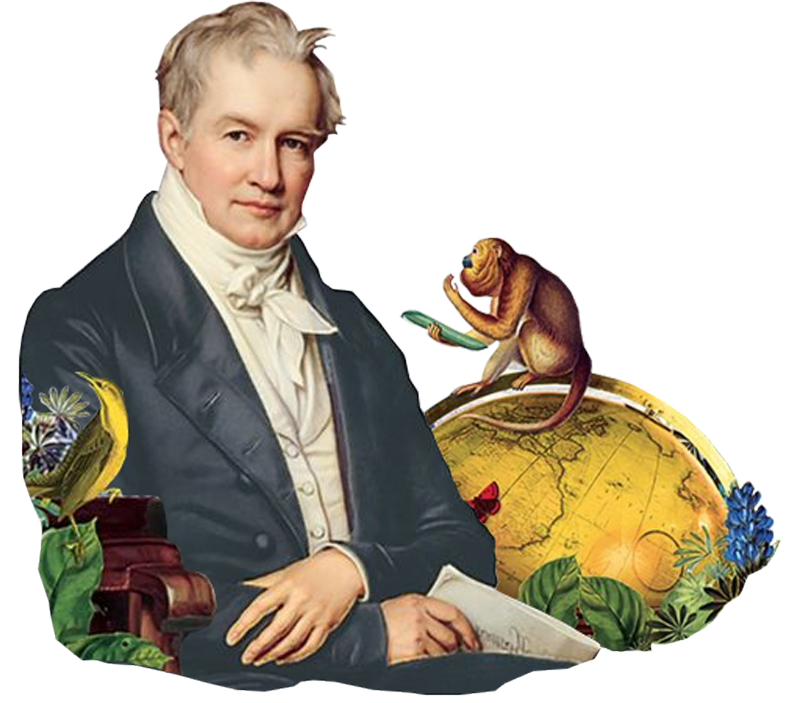
Alexander von Humboldt was a 19th century German naturalist, geographer, explorer and scientist. He is widely considered one of the founders of modern geography and one of the foremost natural history scientists of his time. Humboldt was born in 1769 in Berlin, Germany, and studied at several European universities, including those in Frankfurt and Göttingen.
In a fun creative exchange, students from the Hack Gaming and Kids Tube courses will articulate a proposal that requires a lot of knowledge exchange through research, interviews, programming and game design. Participate in the IV edition of Game Jam Panamby by creating games based on a challenge inspired by the Martius-Staden Institute exhibition that will be revealed on the day of the event. Everyone is welcome!
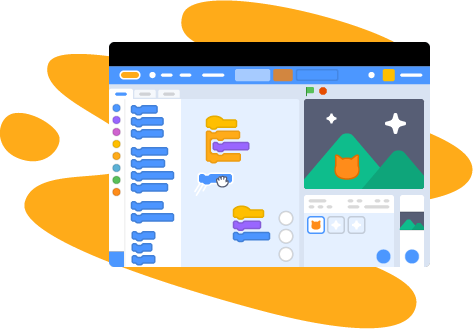
The theme of the Scratch Day 2023 campaign is the poem “The Hundred Languages of the child”, by Loris Malaguzzi, developer of the Italian educational approach for the Reggio Emilia schools.
Let’s all together explore languages, worlds, dreams, realities, forms of expression and transformation of society, reflecting on how our actions can contribute to valuing plurality in a world with more than 8 billion people with stories, languages, characteristics, ideas, cultures and thoughts that make up the humanity of Planet Earth.
The child is made of a hundred.
The child has a hundred hands, a hundred thoughts, a hundred ways of thinking, playing and speaking.
A hundred, always a hundred ways of listening, of wondering and of loving.
A hundred joys to sing and understand.
A hundred worlds to discover.
A hundred worlds to invent.
A hundred worlds to dream.
The child has a hundred languages (and then a hundred, a hundred, a hundred), but ninety-nine were stolen.
School and culture separate the head from the body.
The child is told to: think without the hands, do without the head, listen and not speak.
To understand without joy, to love and wonder only at Easter and Christmas.
The child is told to: discover a world that is already there, and out of a hundred, ninety-nine were stolen.
The child is told: that play and work, reality and fantasy, science and imagination,
heaven and earth, reason and dreams, are things that do not belong together.
Finally, the child is told: that the hundred do not exist.
The child says: On the contrary, the hundred do exist.
Loris Malaguzzi
Translation: Nana Lopes
Inscrições limitadas e se encerram no dia 19/05 às 16h